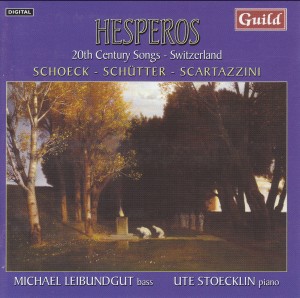|
|
World music CD DVD shop and Classic distribution
|
|
|
|
| SCHOECK, Othmar (1886-1957) | | | Zwölf Eichendorff-Lieder Op. 30 | | | 1. | Waldeinsamkeit | 1:53 | | | 2. | Kurze Fahrt | 0:54 | | | 3. | Winternacht | 2:13 | | | 4. | Im Wandern | 1:54 | | | 5. | Sterbeglocken | 2:12 | | | 6. | Ergebung | 2:00 | | | 7. | Nachklang | 1:50 | | | 8. | Der verspätete Wanderer | 2:38 | | | 9. | Nacht | 1:37 | | | 10. | Lockung | 2:14 | | | 11. | An die Lützowschen Jäger | 2:34 | | | 12. | Auf dem Rhein | 1:38 | | | SCHÜTTER, Meinrad (b.1910) | | | Ausgewählte Lieder | | | 13. | Dumonda (Bitte) | 2:22 | | | 14. | Herbsttag | 2:14 | | | 15. | Der Tod | 1:18 | | | 16. | Die müden Sterne | 1:49 | | | 17. | Nächtliche Lampe | 2:53 | | | 18. | Zona dal Plaschair (Zone des Vergnügens) | 4:33 | | | 19. | Favuogn (Föhnmorgen) | 3:57 | | | SCARTAZZINI, Andrea Lorenzo (b.1971) | | | Sappho-Lieder | | | 20. | Dieser morgen war | 2:32 | | | 21. | In der mitte des tages | 1:42 | | | 22. | Hesperos du bist der | 1:13 | | | 23. | Der mond in der dämmerung | 1:45 | | | 24. | Die sterne gehen wie kienspäne | 1:07 | | | 25. | An meinem bett stand sie | 2:37 | | This collection of songs by the Swiss composers Othmar Schoeck, Meinrad Schütter and Andrea Lorenzo Scartazzini describes a path through the 20th century through the time, history and chronology of their origin: its beginning and first half through Othmar Schoeck (*1886), the romantic, who was born rather late, -the early 30s, neo.-classicism and influences of dodecaphonic music as far as the post-modern era of the 90s through Meinrad (*1910), - as well as the end, transition and beginning of the new millennium with Andrea Lorenzo Scartazzini.
Contrasting musical personalities a contrasting work, which, however, shows certain connections, although the composers have their own tonal language and form of expression.
We hear some of the more rarely performed compositions and the cycle of the Sappho-Lieder for lower voice and piano by Scartazzini is a premiere, which was specifically composed for this CD.
Songs by Othmar Schoeck were one of the first major musical impressions of the young Meinrad Schütter, whose own songs can be seen as their newly formulated continuation. Both composers have their roots in the romanic age of the 19th century and despite their differences they both deliver music of large-scale phrases and arches of breath and melody.
Othmar Schoeck and Meinrad Schütter, though belonging to different age groups, experienced two wars, the effects of which could be seen in all areas of society and within music and literature. Swiss artist between 1939 and 1945 lived largely in a climate of isolation and only today in the era of post-modernism some of the Swiss composers born before W.W.I are being recognised. First successes found little acclaim in their own country. This includes among others. Othmar Schoeck and Meinrad Schütter, and only those who emigrated, such as Arthur Honegger and Frank Martin found lasting international recognition. (Chris Walton)
|
|


